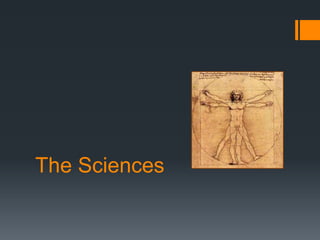
The sciences
- 1. The Sciences
- 2. What are the Sciences? Science is a systematic enterprise that builds and organizes knowledge in the form of testable explanations and predictions about the universe. In an older and closely related meaning (found, for example, in Aristotle), "science" refers to the body of reliable knowledge itself, of the type that can be logically and rationally explained. Is used in a broad sense denoting reliable knowledge about a topic, in the same way it is still used in modern terms such as library science or political science. More often refers to a way of pursuing knowledge, not only the knowledge itself. It is often treated as synonymous with 'natural and physical science, and thus restricted to those branches of study that relate to the phenomena of the material universe and their laws, sometimes with implied exclusion of pure mathematics.
- 3. The Sciences Include… Natural sciences Space sciences Earth sciences Life sciences Chemistry Physics Formal sciences Computer sciences Logic Mathematics Statistics Systems science Professions and Applied sciences Agriculture Architecture and Design Business Divinity Education Engineering Environmental studies and Forestry Family and consumer science Health science Human physical performance and recreation Journalism, media studies and communication Law Library and museum studies Military sciences Public administration Social work Transportation
- 4. History of the Sciences "If a man will begin with certainties, he shall end in doubts; but if he will be content to begin with doubts, he shall end in certainties." — Francis Bacon (1605) The Advancement of Learning, Book 1, v, 8 A skeptical point of view, demanding a method of proof, was the practical position taken as early as 1000 years ago. The scientific method seeks to explain the events of nature in a reproducible way. The sciences exist to examine the phenomena of nature.
- 5. Writing & Inquiry in the Sciences In your science classes, you are likely to be asked to write one of two kinds of papers: the lab report and the review of the literature. The lab report is a straight forward summary of your experiment's purpose, methods, and results. The typical lab report will have: An introduction, which states the problem, question, hypothesis, or objective. The introduction should state why this problem is worth investigating. A summary of your methods, told chronologically and precisely, so that other scientists might replicate them. A summary of your results, in which you lay out for your readers the data that your research has generated. Again, you will want to present these results clearly, thoroughly, and precisely. A discussion of your results, in which you explore their significance. Even if your results haven't provided you with the information you sought, they remain important in that they might suggest other experiments to scientists interested in your subject. A review of the literature looks at what has been published on a given problem; however, it is not simply a summary of what's been written. It is instead a paper that tries to synthesize existing articles to form a coherent and thorough understanding of the matter at hand. It also evaluates these articles and the experiments upon which they are based, alerting the reader to potential weaknesses.
- 6. Preferred Style of Writing Because the purpose of most scientific writing is to present evidence that is verifiable, it's important to write with an almost mathematical precision. Forget adjectives and adverbs: scientific writing is rooted in nouns (natural phenomena) and verbs (their behavior). It is not important when writing a scientific paper to be eloquent. It is absolutely important, however, that you be clear. Finally, it is important to understand that scientific writing is often a collaborative effort. More than one scientist will contribute to a lab report or journal article. Accordingly, it's important to avoid any sense of individual style. The very consistent voice of scientific writing makes collaborative efforts seem seamless, permitting them to read as if they were all "of a piece."